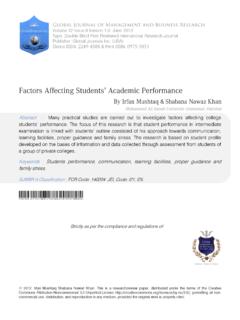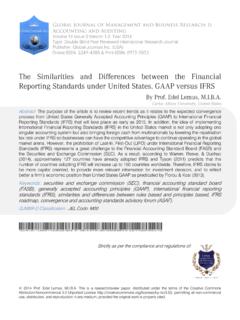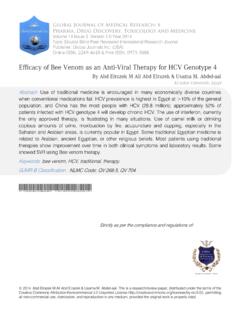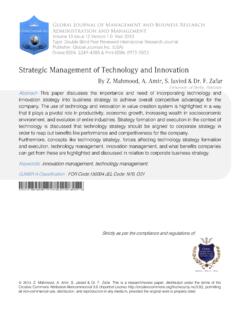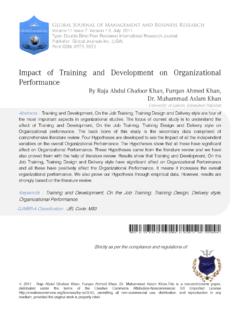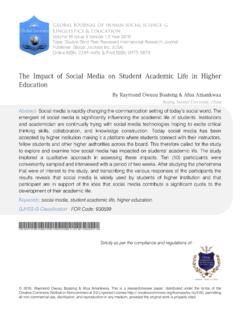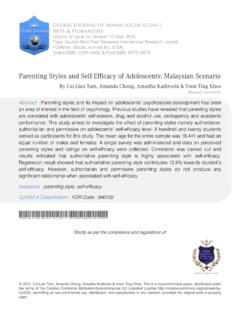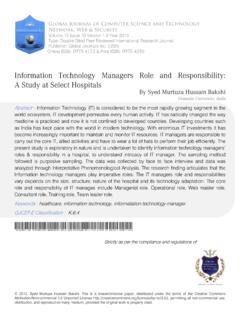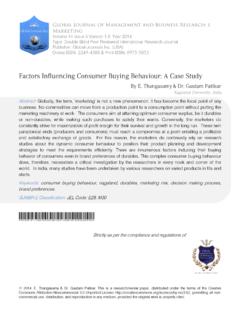Transcription of Implications of the Shifting Paradigms in eLearning for ...
1 2012. Dr. Allah Nawaz & Muhammad Zubair is a research/review paper, distributed under the terms of the Creative Commons Attribution-Noncommercial Unported License ), permitting all non-commercial use, distribution, and reproduction in any medium, provided the original work is properly cited. Global Journal of Management and Business Research Volume 12 Issue 6 Version March 2012 Type: Double Blind Peer Reviewed International Research Journal Publisher: Global Journals Inc. (USA) Online ISSN: 2249-4588 & Print ISSN: 0975-5853 Implications of the Shifting Paradigms in eLearning for Developing Countries like Pakistan By Dr.
2 Allah Nawaz & Muhammad Zubair Khan Gomal University Pakistan Abstract - This paper explores the multiplicity of paradigm shifts in eLearning applications of information and communication technologies (ICT) in higher education institutions (HEI) around the world. Education is reported as the biggest user of software products thus, intentional or unintentional, changes are occurring in user-perceptions, use, and use-environments. These are called paradigm-shifts in the structure and roles of higher education. The advances in educational technologies (ETS) are pressing users to change not only in practice but also in conceptions, attitudes, and culture.
3 These shifts are occurring from: 1. technocracy to democracy, 2. behavior to belief, 3. computerization to personalization and 4. from teacher to student-centered learning. Catching up with these departures warrant hectic efforts by government, HEI, and the university constituents: teachers, students and administrators. Developed and developing states are handling it differently due to the diversities of technologies available, professionalism, and variations in political, economic, social and cultural contexts.
4 Keywords : Globalization, Paradigm-Shifts, Objectivism, Constructivism. GJMBR-B Classification : FOR Code: 150307, JEL Code: O32,O33 ImplicationsoftheShiftingParadigmsineLea rningforDevelopingCountrieslikePakistan Strictly as per the compliance and regulations of: Implications of the Shifting Paradigms in eLearning for Developing Countries like PakistanDr. Allah Nawaz & Muhammad Zubair Khan Author : Assistant Professor, Department of Public Administration, Gomal University, KPK, Pakistan.
5 E-mail : Author : Lecturer, Department of Political Science, Gomal University, KPK, Pakistan. E- mail : Abstract - This paper explores the multiplicity of paradigm shifts in eLearning applications of information and communication technologies (ICT) in higher education institutions (HEI) around the world. Education is reported as the biggest user of software products thus, intentional or unintentional, changes are occurring in user-perceptions, use, and use-environments. These are called paradigm-shifts in the structure and roles of higher education.
6 The advances in educational technologies (ETS) are pressing users to change not only in practice but also in conceptions, attitudes, and culture. These shifts are occurring from: 1. technocracy to democracy, 2. behavior to belief, 3. computerization to personalization and 4. from teacher to student-centered learning. Catching up with these departures warrant hectic efforts by government, HEI, and the university constituents: teachers, students and administrators. Developed and developing states are handling it differently due to the diversities of technologies available, professionalism, and variations in political, economic, social and cultural contexts.
7 Keywords : Globalization, Paradigm-Shifts, Objectivism, Constructivism. I. INTRODUCTION s the learning technologies are mushrooming and becoming more and more inexpensive and widely accessible, the modes of teaching, learning and education delivery are going through significant changes. There are paradigm shifts in different dimensions of eLearning and the environment around it. For example, the teacher s role has shifted from being a sage on the stage to guide on the side (Tinio, 2002; Young, 2003; Mehra & Mital, 2007).
8 Modern eTeacher is mentor, coach or facilitator for the successful integration of ICTs into the pedagogy (Bl zquez & D az, 2006). Likewise, contemporary students are called Millennials, Electronic Natives, the Net Generation who are grown up digital therefore possess absolutely new learning habits like independence and autonomy in their learning styles and multitasking due to the availability of new gadgets (Nawaz & Kundi, 2010c; Nawaz & Kundi, 2011). ICTs are playing most influential catalyst role ever recorded in the history of mankind.
9 First computers and then communications (networking, internet, web-applications, and web ) have transformed the whole world into a global- village where everybody is virtually connected with everybody else as a world-citizen . This has triggered the initiatives for the globalization of economies, organizations, knowledge, and culture (Young, 2003). The shift from an isolated world to a universal-community is however, not automatic and mechanical, rather value-driven , requiring multiple intellectual, psychological, cultural and social changes in the existing mindset (Loing, 2005).
10 There is diversity of factors which either support or block the change or Shifting process. These factors relate to both the technologies as well as the characteristics of users, organizations, government and society as a whole (Nawaz & Qureshi, 2010b). Traditionally, students used transmissive modes of learning, however, now there are shifts from content-centered to competency-based curricula as well as departures from teacher-centered delivery to student-centered delivery where students are encouraged to take on the driving seat for their own learning (Oliver, 2002).
